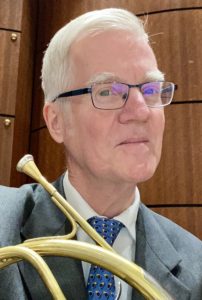It all started because my colleagues knew that I had never been to San Francisco. That was the location of the 2007 ROPA conference, and they thought that their gay colleague should be the ROPA delegate for the Grand Rapids Symphony and take a trip to this city with so much LGBTQ history.
So I took the bait, ran for office, won the election, and headed to San Francisco a few months later. Boy, was I in for a surprise. Learning about the historic labor movement in the city, and even the loss of life that occurred while defending the rights of the workers, made a huge impression upon me and awakened my activist spirit. By the end of the week, I ran for a member-at-large position on ROPA’s Executive Board and won. Nine months later, due to the economic downturn, ROPA President Tom Fetherston resigned before finishing his term, and Vice President Carla Lehmeier stepped into that position. ROPA’s Executive Board appointed me to the vacant vice president seat, and I ran for office at the next conference and rightfully won that post.
All of this happened within the span of one year. What if my GRS colleagues hadn’t urged me to run, using a free trip to San Francisco as an incentive? What if I had lost that election to be their delegate, or the election at ROPA? Sometimes the cards line up at the right time, and for the right reasons.
As I served as vice president of ROPA for the next three years, as well as their Media Committee chair, I noticed that the peer orchestras of the Grand Rapids Symphony belonged to ICSOM. After researching the membership process, I led the campaign for the GRS to join ICSOM. And so we did, in 2013, when ICSOM’s delegates voted to approve the GRS application at the Kansas City conference.
With my background in ROPA, I wanted to serve in a leadership role in ICSOM. In 2015, I was elected to a member-at-large position on ICSOM’s Governing Board, and became ICSOM president in 2017. And now, nine years later, I end my time as a member of ICSOM’s Governing Board.
The decision to not run for re-election as president was a difficult one. This year I have enjoyed working with ICSOM’s new chairperson, Keith Carrick, and we had an opportunity to visit the musicians of the Alabama Symphony Orchestra and Oregon Symphony this season. However, soon after becoming the secretary-treasurer of AFM Local 56 in Grand Rapids last January, I realized that there were not enough hours in the day to handle both jobs, in addition to playing horn in the Grand Rapids Symphony.
Last February I informed the Governing Board of my decision so that they could begin identifying suitable candidates to run for this important post.
This will be my last President’s Report, but I do not want this to be the end of our conversations. Far from it! Seven years was a long time to serve as ICSOM president—especially since it included the pandemic years. A visit to the online Senza page at our website will show that I wrote a President’s Report for every issue of our newsletter. Perhaps a common thread will emerge from viewing the titles of my articles, in that I sought to encourage communication within our organization, such as when I researched the role that women played in ICSOM’s history.
Which brings us to where we are in 2024. Women continue to have a strong impact upon our organization. Unfortunately, this impact was punctuated by disturbing incidents that came to light this year in the New York Philharmonic. We cannot change the past, but we certainly can learn from it. And that is the intention of the Governing Board as ICSOM moves forward. This summer’s annual conference should be a clear indication that we seek to educate and improve, as is this special edition of Senza Sordino.
At last summer’s conference, Keith and I presented a breakout session regarding how to build cohesive colleagues. One of the suggestions was to encourage in-person musician get-togethers. That was the advice that I had given to the ten orchestra committees that I visited in the 2022–23 season, which included the New York Philharmonic. Sadly, such an event for them in the summer of 2010 had devastating effects. My stomach turned when I made that connection, which led me to ask if we should continue to have such meetings?
Of course we should, and now more than ever. We cannot move forward without connecting, but it must be done better. Talk. Listen. Research. Respect. Grow. Improve. We can do better. We must do better.
Don’t let my election track record fool you. I don’t always win. In 2010, I took a New York Philharmonic horn audition, and I lost. A much better player than me rightfully won the audition. Today I want that player to know that she continues to have my respect. Her name is Cara Kizer.






